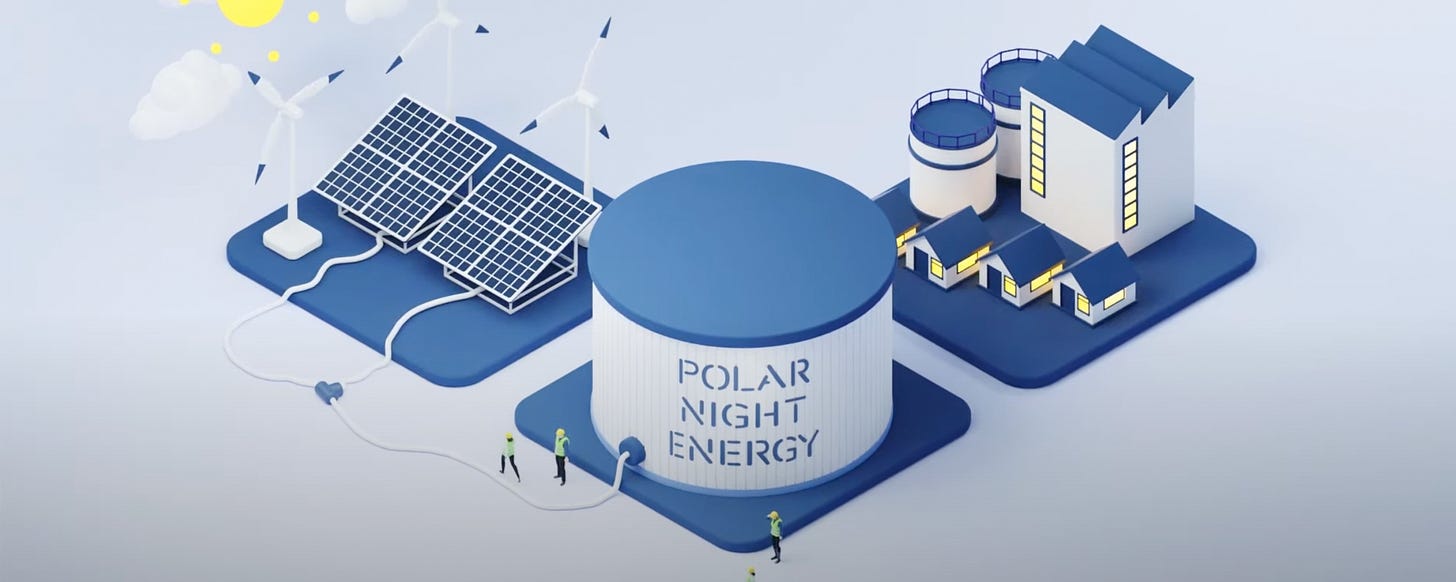Batteries made of sand?!
Sand batteries, extreme Asian heat wave, and Climate Cafés
GOOD NEWS
The tiny southern town of Pornainen, Finland is getting a 1-megawatt sand battery. The battery will be capable of storing up to 100 MW-hours of thermal energy for months at a time, entirely weaning the town off oil. This will be Finland's second sand battery after a smaller one was built by the same company, Polar Night Energy, in the town of Kankaanpää in 2022. That first one was the first fully functional sand battery ever built.
How do sand batteries work? A heat exchanger inside a giant, insulated silo full of sand takes energy from renewable wind and solar power and stores it in the sand as heat. The sand can store heat at up to 500 degrees Celsius for weeks to months. When the heat energy is needed, the sand battery sends hot air to warm water in the district heating network. For more, see this video.
We'll need a plethora of practical and innovative ways to store energy from renewable sources when the wind isn't blowing and the sun isn't shining, so I am excited to hear about these sand batteries and I hope more are built around the globe!
NOT-SO-GOOD NEWS
Hundreds of millions of people in South and Southeast Asia have been suffering through an extended heat wave these last few weeks. Temperature records have been falling like dominoes across Myanmar, Laos, and Vietnam. "Thousands of records are being brutalized all over Asia, [by] far the most extreme event in world climatic history," said Maximiliano Herrera, a weather historian, in late April.
In Vietnam, for example, hundreds of thousands of fish have died in the Song May reservoir thanks to the scorching temperatures and dropping water levels. In the Philippines, soaring cooling demand is driving power outages. Over 1,500 have already died in Myanmar from extreme heat, while in Thailand the normally lucrative durian harvest one of the country’s main exports, is failing.
Children especially are at risk from this heat, with the UN Children’s Fund estimating that “around 243 million children are exposed to hotter and longer heatwaves, putting them at risk of a multitude of heat-related illnesses, and even death." In Cambodia, where temperatures have reached a 170-year high, the school day has been shortened by two hours due to extreme heat. And in the Philippines, school was canceled at for 47,000 public schools for two days last week. "We know that global warming is only going to get worse,” said UNICEF’s Sheldon Yeti. “We cannot ignore children’s education needs.”
WHAT YOU CAN DO
If you’re feeling anxious about climate change, you’re not alone—and talking about it can help. Local and online "climate cafés" are popping up that encourage people do just that. These community-organized spaces facilitate open, frank discussions about the climate crisis and the emotions that living in this particular moment brings up. They also help like-minded people connect, collaborate, and build community so we know we’re not alone.
If you’d be interest in attending a climate café, Force of Nature has a list and the Climate Café Network Hub is another online collection of cafés around the world. And if there isn’t one where you live, consider hosting! The Climate Psychology Alliance offers free workshops to help you get started and a regular climate café facilitator support group, while the network hub above has resources you can use to get started – and you can register your group on their website, so others can join.





Super interesting article, thanks for sharing! 🙏
I’ve worked in cleantech and batteries for a long time. I’ve never heard of sand batteries before. Thanks for sharing